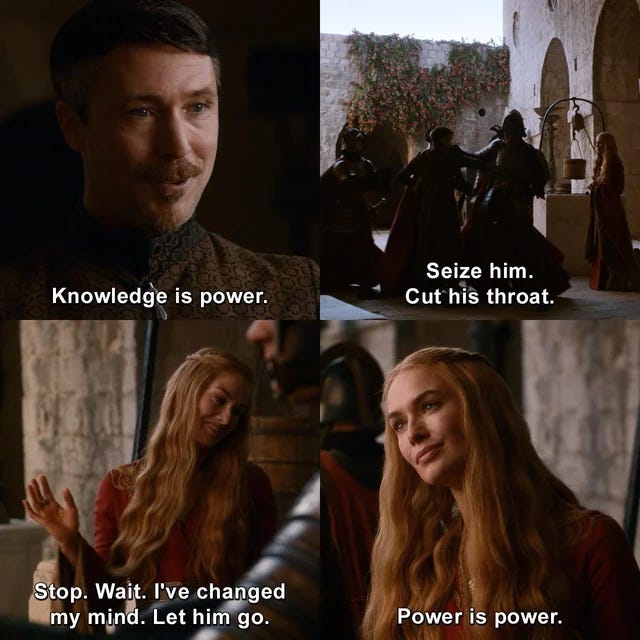Jimmy Kimmel has been indefinitely suspended for making jokes MAGAs don’t like (and to be fair, also lying about the Kirk shooting). Bari Weiss is about to be offered a major executive role at CBS. Columbia signs an agreement with the Trump administration promising not to engage in DEI and accepting a monitor to scrutinize academic programs. Normal people in normal jobs are being fired for celebrating Charlie Kirk’s death, or in some cases not sufficiently mourning him.
Just a few years ago, left-wing cancel culture seemed permanently dominant because it had won the hearts and minds of educated Americans. This quick turnaround reminds me of the scene in Game of Thrones where Lord Baelish tries to intimidate Cersei by implying that he knows about her relationship with her brother, reminding her that “knowledge is power.” She responds by telling the men under her command to seize him and cut his throat. The Queen then orders them to stop, walk back three paces, turn around, and close their eyes. Having made her point, she then corrects him: Power is power.
As it turns out, you can just take over the government, and intimidate, cajole, and cancel your enemies into submission. In their fantasies, this is how many Republicans think Democrats have behaved. But the old cancel culture was a ground-up phenomenon. A few years ago, we would talk about low-level employees in the offices of big tech companies or NGOs demanding adherence to woke orthodoxy. What we are now witnessing is new, in that you have the Vice President telling the public to call people’s bosses and get them fired. The Commissioner of the FCC openly does Trump’s bidding, as the Secretary of Transportation retweets airlines to tell them that they should fire pilots who say insensitive things about Charlie Kirk, and they follow his orders. Texas is investigating hundreds of teachers on the same grounds.
Social media has coined the term “woke right” to point out the ways in which the new right-wing cancel culture resembles its liberal counterpart. Yet there are important differences here that deserve careful thought and attention. Most analysts fall into the trap of simply declaring one better or worse than the other. I think a more useful approach would stress that each is worse in its own ways, and nothing forces us to make an apples-to-apples comparison. It reminds me of how, when someone would bring up January 6, conservatives who couldn’t defend the actions of that day would talk about BLM rioters. I happen to think coups to overthrow the government and violent disturbances that kill people and burn down stores are both really bad. They’re of course bad in different ways. BLM riots cost a lot more lives, both directly and likely also through their effects on policing. But the president leading an attempted coup is bad too, and deserves a lot more attention than regular street crime. Arguments over which is worse are stupid and unproductive, and employed by partisans more interested in scoring points against the other side than understanding the world. We don’t debate whether the Kennedy assassination was worse than the urban riots of a few years later that killed more people. Crime and political violence are both phenomena worth analyzing on their own merits.
It’s the same with these two forms of cancel culture. First, perhaps the most important point that needs to be made is that top-down campaigns are in many cases a lot more dangerous. The government setting out to cancel people for their views looks a lot more like traditional authoritarianism than a company being scared of its employees or social media mobs. These are people with power, and they have no compunctions about using it. In the heyday of wokeness, top Democrats rarely if ever called on individual citizens to be fired for their views. If they occasionally used the regulatory state to shape corporate behavior, their actions were a lot more subtle and constrained by certain norms. The professionals who worked for them saw themselves as bureaucrats or public servants first, which certainly isn’t true under MAGA, where personal loyalty to the president is the most important qualification for a top level position. Here’s a good article recounting the events that led to the Kimmel suspension. What the Trump administration and its allies are doing is therefore much more of a direct threat to democratic institutions, and this goes beyond simply leading right-wing cancellation efforts. The current president is hostile to the rule of law and corrupt at levels that are off the charts by historical standards, and factors like this also need to be considered.
The left could move beyond wokeness, because it had other priorities and goals. In many ways, the Democratic establishment and the leaders of left-leaning institutions were themselves caught off guard by what was happening underneath their feet. Although many rightists think otherwise, cancel culture was never a mobilization strategy for the political left, but rather a bottom-up phenomenon. In contrast to normal Democratic politicians, for someone like JD Vance, fighting the left is fundamental to his worldview and identity as a political actor. This is why things could get much worse after Trump, as we go from a situation where everyone is taking after a single leader to one where amoral power politics makes up a large portion of the conservative project. I’ve pointed out before that MAGA is very confused in terms of how it feels about basic public policy issues like support for capitalism and what America’s role in the world should be. Vance and his biggest supporters feel more strongly about fighting the left than they do about what the tax system should look like or tariff rates, or even broader philosophical issues. What unites right-leaning factions at this point in time is hostility to their enemies, and this attitude of politics as total war – with or without widespread agreement about what you’re even fighting for – is becoming embedded within the culture of the conservative movement. They keep bringing up Carl Schmitt for a reason, as the concept of the friend-enemy distinction gives them intellectual cover to be part of a movement driven mostly by resentment, even when it is uncertain about its ultimate political goals and what it is actually defending.
That being said, there is a sense in which it doesn’t feel as though this right-wing cancel culture is nearly as oppressive as its left-wing equivalent was a few years ago. I can explain from the perspective of my own situation. Before Elon Musk bought Twitter, I was always walking on eggshells, and even once ragequit after multiple unfair suspensions. My views on race, gender, and sexuality ensured I was always one mistake away from being driven from social media. Today, Elon owns the platform, and I spend my time personally insulting him, dunking on his tweets, and writing about how he is a curse on public life. I also insult MAGAs, and mock their deepest beliefs, which include ideas like women should be forced to give birth to Down syndrome babies and pedophilia is a major societal problem that we should prioritize fighting. Yet I have not been kicked off or suspended from social media. Even as an opponent of the Trump administration, I feel safer expressing my opinion on Elon Musk’s X than I would be if it was under old management. Elon has called for Destiny to go to prison, but still lets him post on X. I don’t think this is unique to my own personal situation. I’m sure that being a professor opposed to Trump today is a lot easier than being one who wanted to speak out against the concept of systemic racism five years ago. In fact, it’s probably still easier to denounce Trump on nearly all college campuses. The story might be different if you are say a liberal coffee shop owner in Missouri, where wokes pose no threat to you but frothing at the mouth MAGAs are now more likely to start a successful boycott campaign over you making fun of Trump supporters on social media or something.
As it turns out, a culture that empowers tens or hundreds of thousands of busybodies, many of them with influential jobs in areas like journalism or the legal profession, can be a lot more oppressive than one in which the president picks out a few random individuals and institutions and seeks to personally destroy them. There are a lot of aggressive MAGAs out there doing stuff like ordering Charlie Kirk’s favorite drink and demanding the barista put his name on it, but they seem to get their kicks by harassing individual service workers, without being part of the knowledge class with the ability to shape the wider culture.
Trump is vindictive and cares nothing for free speech, but he is only one man and can only pay attention to so much at any one time. Pete Buttigieg as Secretary of Transportation never called for anyone to be fired, but on the ground, pilots were probably at least as scared to criticize George Floyd in 2020 as they are to denounce Charlie Kirk today. Left-wing cancel culture infected seemingly everything – not only academia and journalism, but also knitting clubs, birdwatching, board games, and the naming of grocery items. Even if he were inclined to do so, Trump would not be able to build the infrastructure to impose a totalitarian system that could reach into this many areas of life.
And it seems unquestionably true that the people being cancelled today are overwhelmingly those who would be trying to destroy others for deviations from left-wing thought if the situation were reversed, and in some cases did so not that long ago. Purging these people from institutions and creating consequences for their actions can have salutary long-term effects, as stupid as I think it is that people have to all pretend like they’re sad that Charlie Kirk died.
One argument against continuing on this path is that the MAGAs have to be careful with what they’re unleashing. Before, we saw left-wing cancel culture from below without much support from the top. Now, we’re getting a right-wing cancel culture that is dependent on top-down control but lacks the same organic base of energetic volunteers passionate about enforcing their will on others. Neither side has established a completely authoritarian regime because each is missing one of the two essential ingredients.
Maybe we are not exactly veering towards authoritarianism of one side or the other here. I’m cautiously optimistic that some kind of equilibrium has been reached. Leftists are scared of the government, conservatives are scared of journalists, academics, and activists. A right-wing government therefore goes after this oppressive class, which takes away its cultural power and limits the damage it can do to other people. At the same time, most educated people being liberal helps put roadblocks in the way of the government establishing an authoritarian regime that reaches into all areas of public life. This doesn’t mean that every right-wing cancellation is justified, or that Jimmy Kimmel wasn’t wronged.
All this of course depends on liberals getting power and not behaving like MAGAs do now. In that case, we might be in real trouble. But I think that it will be hard for any administration to reverse the changes that have been made overnight. DEI bureaucracies have been dismantled, wokes have been fired, and Bari Weiss is probably going to have an editorial role at CBS. Even if a Democratic administration wanted to undo all this, it would have to move very quickly, and it would probably take a few years to get its footing and reverse the accomplishments of the Trump administration. By the time they were ready to institute left-wing authoritarianism, we may be back to a Republican administration. This is setting aside the fact that, as much as conservatives deny it, liberals actually do believe in this democratic norms stuff they’re always talking about. We saw this in how they unanimously accepted the results of the 2024 election, while it seems hard to even imagine Republicans losing a presidential election at this point and not all agreeing it was stolen.
I won’t predict where all this is going. What I can say is that I hate this administration, in large part for anti-vaxx and immigration-related reasons, and yet even as a critic I feel a lot freer to speak my mind than I imagine I would under a left-wing cancel culture of the kind we saw not that long ago. That said, the point isn’t to settle scores from the past or to make cosmic judgments about who is worse. Today, the current administration is not only the primary threat to individual liberty, but also our ability to maintain first world institutions. For that it needs to be resisted.
Source link



